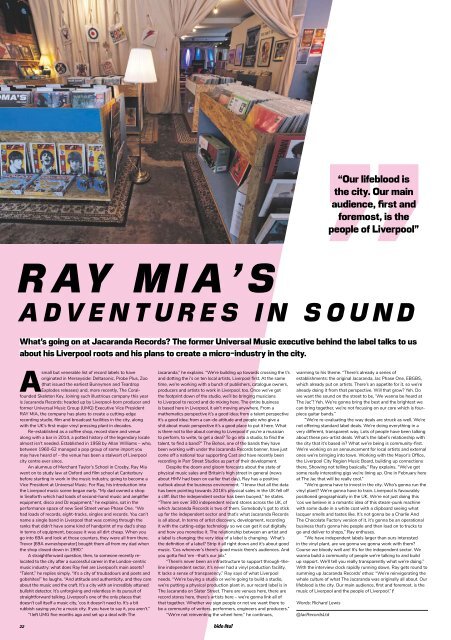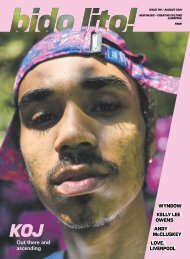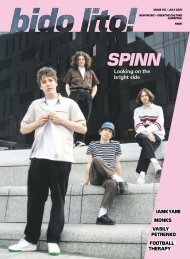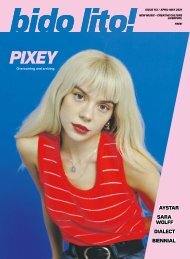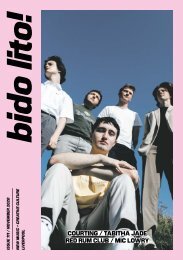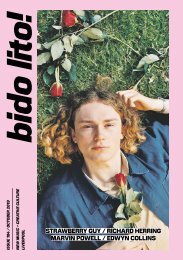Issue 96 / February 2019
February 2019 issue of Bido Lito! magazine. Featuring: EYESORE & THE JINX, LADYTRON, LEE SCOTT, ERIC TUCKER, INTERNATIONAL TEACHERS OF POP, KYAMI, RAY MIA, YVES TUMOR, BILL RYDER-JONES and much more.
February 2019 issue of Bido Lito! magazine. Featuring: EYESORE & THE JINX, LADYTRON, LEE SCOTT, ERIC TUCKER, INTERNATIONAL TEACHERS OF POP, KYAMI, RAY MIA, YVES TUMOR, BILL RYDER-JONES and much more.
Create successful ePaper yourself
Turn your PDF publications into a flip-book with our unique Google optimized e-Paper software.
“Our lifeblood is<br />
the city. Our main<br />
audience, first and<br />
foremost, is the<br />
people of Liverpool”<br />
RAY MIA’S<br />
ADVENTURES IN SOUND<br />
What’s going on at Jacaranda Records? The former Universal Music executive behind the label talks to us<br />
about his Liverpool roots and his plans to create a micro-industry in the city.<br />
A<br />
small but venerable list of record labels to have<br />
originated in Merseyside: Deltasonic, Probe Plus, Zoo<br />
(that issued the earliest Bunnymen and Teardrop<br />
Explodes releases) and, more recently, The Coralfounded<br />
Skeleton Key. Joining such illustrious company this year<br />
is Jacaranda Records: headed up by Liverpool-born producer and<br />
former Universal Music Group (UMG) Executive Vice President<br />
RAY MIA, the company has plans to create a cutting-edge<br />
recording studio, film and broadcast facilities in the city, along<br />
with the UK’s first major vinyl pressing plant in decades.<br />
Re-established as a coffee shop, record store and venue<br />
along with a bar in 2014, a potted history of the legendary locale<br />
almost isn’t needed. Established in 1958 by Allan Williams – who,<br />
between 1<strong>96</strong>0-62 managed a pop group of some import you<br />
may have heard of – the venue has been a stalwart of Liverpool<br />
city centre ever since.<br />
An alumnus of Merchant Taylor’s School in Crosby, Ray Mia<br />
went on to study law at Oxford and film school at Canterbury<br />
before starting in work in the music industry, going to become a<br />
Vice President at Universal Music. For Ray, his introduction into<br />
the Liverpool music scene began early. “My dad owned a shop<br />
in Seaforth which had loads of second-hand music and amplifier<br />
equipment, disco and DJ equipment,” he explains, sat in the<br />
performance space of new Seel Street venue Phase One. “We<br />
had loads of records, eight-tracks, singles and records. You can’t<br />
name a single band in Liverpool that was coming through the<br />
ranks that didn’t have some kind of handprint of my dad’s shop<br />
in terms of equipment, because it was all dirt cheap. When you<br />
go into 69A and look at those counters, they were all from there.<br />
Trevor [69A owner/operator] bought them all from my dad when<br />
the shop closed down in 1990.”<br />
A straightforward question, then, to someone recently relocated<br />
to the city after a successful career in the London-centric<br />
music industry: what does Ray feel are Liverpool’s main assets?<br />
“Talent,” he replies simply. “It’s a city of troubadours and poets and<br />
gobshites!” he laughs. “And attitude and authenticity, and they care<br />
about the music and the craft. It’s a city with an incredibly attuned<br />
bullshit detector. It’s unforgiving and relentless in its pursuit of<br />
straightforward talking. Liverpool’s one of the only places that<br />
doesn’t call itself a music city, ’cos it doesn’t need to. It’s a bit<br />
rubbish saying you’re a music city. If you have to say it, you aren’t.”<br />
“I left UMG five months ago and set up a deal with The<br />
Jacaranda,” he explains. “We’re building up towards crossing the t’s<br />
and dotting the i’s on ten local artists, Liverpool first. At the same<br />
time, we’re working with a bunch of publishers, catalogue owners,<br />
producers and artists to work in Liverpool, too. Once we’ve got<br />
the footprint down of the studio, we’ll be bringing musicians<br />
to Liverpool to record and do mixing here. The entire business<br />
is based here in Liverpool, it ain’t moving anywhere. From a<br />
mathematics perspective it’s a good idea; from a talent perspective<br />
it’s a good idea; from a can-do attitude and people who give a<br />
shit about music perspective it’s a good place to put it here. What<br />
is there not to like about coming to Liverpool if you’re a musician<br />
to perform, to write, to get a deal? To go into a studio, to find the<br />
talent, to find a band?” The Bohos, one of the bands they have<br />
been working with under the Jacaranda Records banner, have just<br />
come off a national tour supporting Cast and have recently been<br />
recording in Parr Street Studios as part of their development.<br />
Despite the doom and gloom forecasts about the state of<br />
physical music sales and Britain’s high street in general (news<br />
about HMV had been on earlier that day), Ray has a positive<br />
outlook about the business environment. “I know that all the data<br />
has been pointing towards 2018’s physical sales in the UK fell off<br />
a cliff. But the independent sector has been buoyed,” he states.<br />
“There are over 300 independent record stores across the UK, of<br />
which Jacaranda Records is two of them. Somebody’s got to stick<br />
up for the independent sector and that’s what Jacaranda Records<br />
is all about. In terms of artist discovery, development, recording<br />
it with the cutting-edge technology so we can get it out digitally<br />
and how you monetise it. The relationship between an artist and<br />
a label is changing; the very idea of a label is changing. What’s<br />
the definition of a label? Strip it all right down and it’s about good<br />
music. ’Cos wherever’s there’s good music there’s audiences. And<br />
you gotta find ’em –that’s our job.”<br />
“There’s never been an infrastructure to support through-theline<br />
independent sector, it’s never had a vinyl production facility.<br />
It lacks a sense of transparency,” Ray says of what Liverpool<br />
needs. “We’re buying a studio or we’re going to build a studio,<br />
we’re putting a physical production plant in, our record label is in<br />
The Jacaranda on Slater Street. There are venues here, there are<br />
record stores here, there’s artists here – we’re gonna link all of<br />
that together. Whether we sign people or not we want there to<br />
be a community of writers, performers, engineers and producers.”<br />
“We’re not reinventing the wheel here,” he continues,<br />
warming to his theme. “There’s already a series of<br />
establishments: the original Jacaranda, Jac Phase One, EBGBS,<br />
which already put on artists. There’s an appetite for it, so we’re<br />
already doing it from that perspective. Will that grow? Yeh. Do<br />
we want the sound on the street to be, ‘We wanna be heard at<br />
The Jac’? Yeh. We’re gonna bring the best and the brightest we<br />
can bring together, we’re not focusing on our core which is fourpiece<br />
guitar bands.”<br />
“We’re re-evaluating the way deals are struck as well. We’re<br />
not offering standard label deals. We’re doing everything in a<br />
very different, transparent way. Lots of people have been talking<br />
about these pro-artist deals. What’s the label’s relationship with<br />
the city that it’s based in? What we’re being is community-first.<br />
We’re working on an announcement for local artists and external<br />
ones we’re bringing into town. Working with the Mayor’s Office,<br />
the Liverpool City Region Music Board, building up connections<br />
there. Showing not telling basically,” Ray explains. “We’ve got<br />
some really interesting gigs we’re lining up. One in <strong>February</strong> here<br />
at The Jac that will be really cool.”<br />
“We’re gonna have to invest in the city. Who’s gonna run the<br />
vinyl plant? We’re gonna have to train. Liverpool is favourably<br />
positioned geographically in the UK. We’re not just doing this<br />
’cos we believe in a romantic idea of this steam-punk machine<br />
with some dude in a white coat with a clipboard seeing what<br />
lacquer smells and tastes like. It’s not gonna be a Charlie And<br />
The Chocolate Factory version of it, it’s gonna be an operational<br />
business that’s gonna hire people and then load on to trucks to<br />
go and deliver to shops,” Ray enthuses.<br />
“We have independent labels larger than ours interested<br />
in the vinyl plant, are we gonna we gonna work with them?<br />
Course we bloody well are! It’s for the independent sector. We<br />
wanna build a community of people we’re talking to and build<br />
up rapport. We’ll tell you really transparently what we’re doing.”<br />
With the interview clock rapidly running down, Ray gets round to<br />
summing up Jacaranda Records’ ethos: “We’re reinvigorating the<br />
whole culture of what The Jacaranda was originally all about. Our<br />
lifeblood is the city. Our main audience, first and foremost, is the<br />
music of Liverpool and the people of Liverpool.” !<br />
Words: Richard Lewis<br />
@JacRecordsLtd<br />
22


